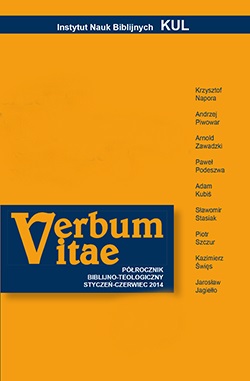Gniew Boga a hermeneutyka krzyżokształtna. Gregora A. Boyda apologetyczna lektura starotestamentalnych tekstów o przemocy nakazanej przez Boga
The Wrath of God and the Cruciform Hermeneutic. Gregory A. Boyd’s Reading of Old Testament Texts Depicting Violence Commanded by God
Author(s): Jacek StefańskiSubject(s): Christian Theology and Religion, Philosophy of Religion, Studies in violence and power, Biblical studies, Hermeneutics
Published by: Katolicki Uniwersytet Lubelski Jana Pawła II - Wydział Teologii
Keywords: wrath of God; violence in the Old Testament; Cross; Christology; herem; open theism;
Summary/Abstract: G.A. Boyd proposes an innovative way of looking at divinely sanctioned violence in the Old Testament, viewing it as part of a divine accommodation that can only be understood in light of the Cross. Boyd suggests that just as God allows mankind to “act toward” His Son by crucifying Him and making Him bear the ugliness of sin, so are human beings allowed to act against the Creator by portraying Him in a distorted manner through images of divinely sanctioned violence. Boyd emphasizes that every depiction of God must be examined in light of God’s stooping toward mankind’s sinfulness through the Cross. If a given Old Testament image of God is in line with the divine acquiescence on the Cross, then the image is to be deemed authentic. If not, it must be deemed a divine accommodation, in the sense that it is not an authentic depiction of God but rather a divinely permitted projection of the inspired authors, who could only portray God within the limits of their sinfulness and of the culture in which they were immersed. Boyd’s thesis becomes problematic, though, because it is questionable whether the Cross can constitute the sole hermeneutical litmus test for the authenticity of a given Old Testament image of God. Even more arguable is Boyd’s contention that God’s intention in having inspired the composition of certain Biblical texts could be at cross-purposes with the intentions of their divinely inspired authors. Boyd’s Old Testament exegesis is engaged from a 21st century perspective and does not pay enough attention to the culpability and eternal consequences of human actions. His thesis is further weakened by a biblical exegesis too often steered by speculation and not always rooted in the biblical text itself.
Journal: Verbum Vitae
- Issue Year: 2018
- Issue No: 34
- Page Range: 465-491
- Page Count: 27
- Language: Polish

